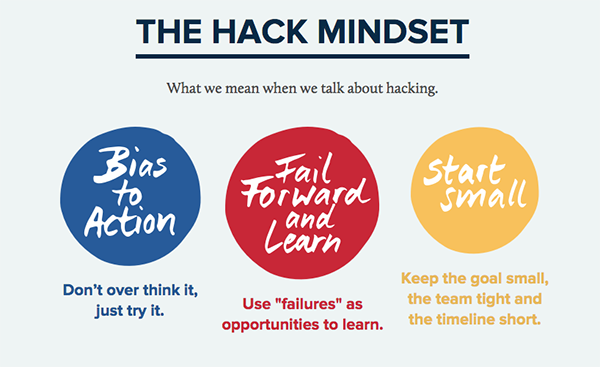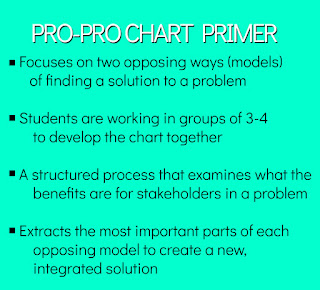Diving Deep
Day two of deeper learning had participants tackling the true essence of the name of this conference: diving deep into learning. The sessions today were not one or two hour sessions, rather a deep dive into one idea for 6 hours. Funny enough, those six hours flew by as we were led through a series of activities crafted around the design thinking process.
The session we attended today, hosted by representatives from School Retool, was called “Empathy-based hacking for school-wide transformation”. Our session was facilitated by Jason Strong, Cassandra Thonstad and Marthaa Torres. As a starting point, we discussed insights learned from Shadow A Student challenge. In Halton, we had completed our version of this challenge and were able to bring our reflections to the table. This was the starting point: empathize with our students.
We then talked, in groups of two, about our passions, our struggles and our own individual visions for how school can be different. This was a big challenge, as we were asked to speak to our partners for four minutes without interruption. Talk about taking a risk and being vulnerable! Four minutes feels like a eternity when you are putting your own beliefs out on the table. Immediately after those four minutes, our partner responded with the ultimate act of validation and active listening, by repeating, re-interpreting and summarizing what you had just said in those rambling four minutes. We capped this off by putting our ideas back into our own words - in 8 minutes, starting from rambling 4 minute visions and ending with a more cohesive idea.
Last task before lunch, we chose one of the Deeper Learning Big ideas. These were curated list by School Retool of the major strategies for engaging deeper learning, coming from the Stanford D.School, IDEO, School Retool, Big Picture Learning, Envision Schools, High Tech HIgh, among others..

After a lunch break we came to the bread and butter of this session, finding a way to implement change in our own buildings. Too often, when thinking about change, we aim to high and go too big. If we try to change too much, too fast, we run the risk of alienating the stakeholders that we need to work with. School Retool works around the idea of hacks, small changes that can lead to big transformations. We had already done the hard work by talking about our aspirations and big ideas. Now it was time to brainstorm, quickly and without pausing to think, any small change that might help us realize our goals.
The philosophy behind “The Hack” is simple. Act quickly, don’t overthink it. Be prepared and willing to fail as any failure is an opportunity to learn. Finally, start small with a short timeline. Extremely short, like actionable starting TOMORROW. By bringing change to the level of a small, scrappy experiment, it allows for you try something new without having to reinvent your entire school After brainstorming it was time to prototype. Individuals created their hack, bringing the brainstorming to life. Throughout this lengthy process, High Tech High students were made available to offer feedback on our prototypes. This created a wonderful iterative process and gave the teachers in the room a real working example of how students can be asked to prototype their own projects.

What was truly amazing about the day was how 1000+ educators could come together and create an exhibition of their own work. After six hours of deep diving our thinking was on full display, for everyone to view, comment on and ask questions about. And the spirit of sharing was contagious. Regardless of which session each person attended, they were able to speak about their own individual thinking as if they were a well polished expert.
So, after day two, not only did we learn about a model to facilitate small changes that can lead to big transformations, we left the conference armed with something we can implement tomorrow!

Facilitating hacking to deeper learning at #DL2018 #DeeperLearning2018 with awesome learners! One S response: “I want to be in your school!” #BeTheChange pic.twitter.com/zOy3gWbxkv— Cassandra Thonstad (@Thonstad) March 29, 2018
The session we attended today, hosted by representatives from School Retool, was called “Empathy-based hacking for school-wide transformation”. Our session was facilitated by Jason Strong, Cassandra Thonstad and Marthaa Torres. As a starting point, we discussed insights learned from Shadow A Student challenge. In Halton, we had completed our version of this challenge and were able to bring our reflections to the table. This was the starting point: empathize with our students.
| Putting aspirations down on paper |
 |
| From Aspirations to Small Hacks |
We then talked, in groups of two, about our passions, our struggles and our own individual visions for how school can be different. This was a big challenge, as we were asked to speak to our partners for four minutes without interruption. Talk about taking a risk and being vulnerable! Four minutes feels like a eternity when you are putting your own beliefs out on the table. Immediately after those four minutes, our partner responded with the ultimate act of validation and active listening, by repeating, re-interpreting and summarizing what you had just said in those rambling four minutes. We capped this off by putting our ideas back into our own words - in 8 minutes, starting from rambling 4 minute visions and ending with a more cohesive idea.
Last task before lunch, we chose one of the Deeper Learning Big ideas. These were curated list by School Retool of the major strategies for engaging deeper learning, coming from the Stanford D.School, IDEO, School Retool, Big Picture Learning, Envision Schools, High Tech HIgh, among others..
After a lunch break we came to the bread and butter of this session, finding a way to implement change in our own buildings. Too often, when thinking about change, we aim to high and go too big. If we try to change too much, too fast, we run the risk of alienating the stakeholders that we need to work with. School Retool works around the idea of hacks, small changes that can lead to big transformations. We had already done the hard work by talking about our aspirations and big ideas. Now it was time to brainstorm, quickly and without pausing to think, any small change that might help us realize our goals.
The philosophy behind “The Hack” is simple. Act quickly, don’t overthink it. Be prepared and willing to fail as any failure is an opportunity to learn. Finally, start small with a short timeline. Extremely short, like actionable starting TOMORROW. By bringing change to the level of a small, scrappy experiment, it allows for you try something new without having to reinvent your entire school After brainstorming it was time to prototype. Individuals created their hack, bringing the brainstorming to life. Throughout this lengthy process, High Tech High students were made available to offer feedback on our prototypes. This created a wonderful iterative process and gave the teachers in the room a real working example of how students can be asked to prototype their own projects.
What was truly amazing about the day was how 1000+ educators could come together and create an exhibition of their own work. After six hours of deep diving our thinking was on full display, for everyone to view, comment on and ask questions about. And the spirit of sharing was contagious. Regardless of which session each person attended, they were able to speak about their own individual thinking as if they were a well polished expert.
Our learning is on display at #deeperlearning as @DFJHPrincipal talks us through the challenges that face our math classrooms and math culture. #DL2018 #HDSBInnovates pic.twitter.com/x1rY0bWnDL— Jamie Mitchell (@DFJH_Mitchell) March 29, 2018
So, after day two, not only did we learn about a model to facilitate small changes that can lead to big transformations, we left the conference armed with something we can implement tomorrow!

Comments
Post a Comment